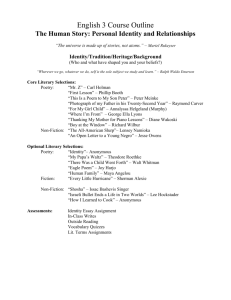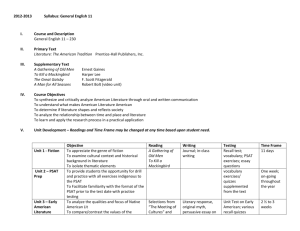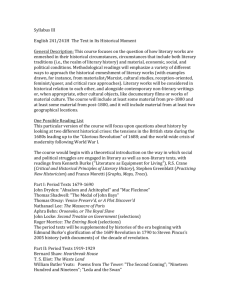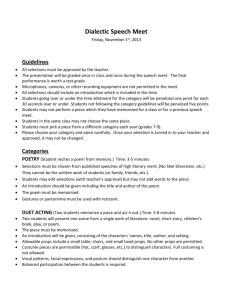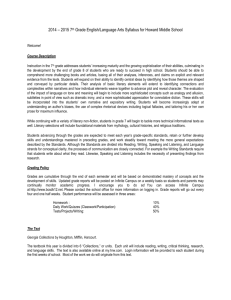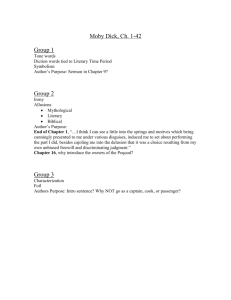Complete packet - Glacier Peak High School
advertisement
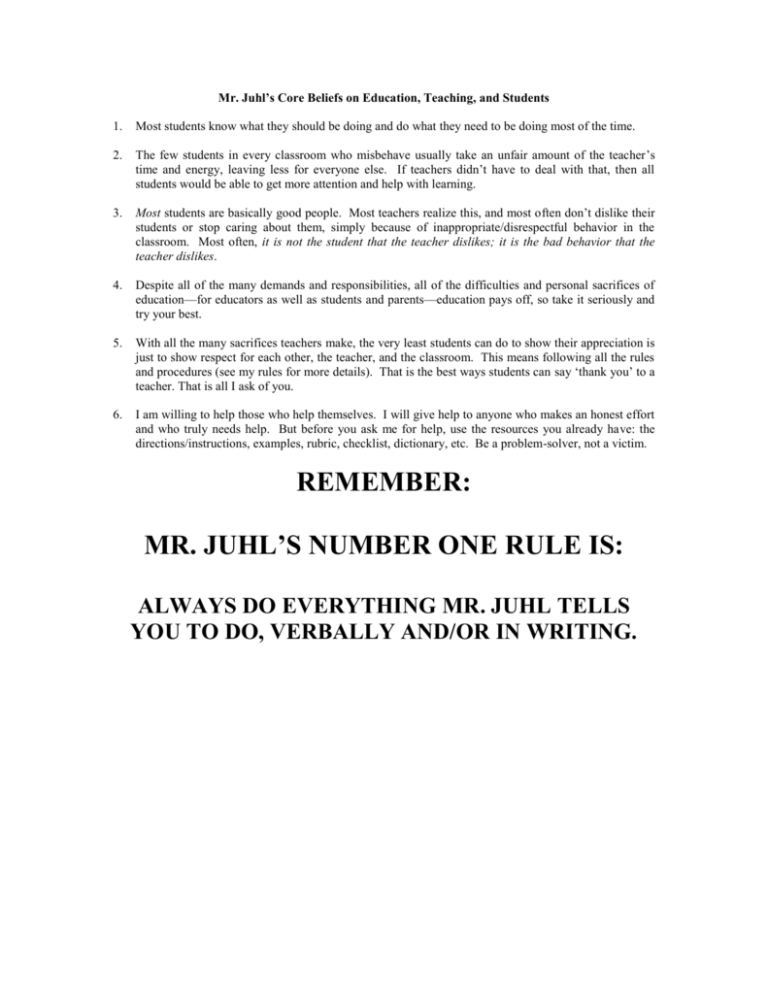
Mr. Juhl’s Core Beliefs on Education, Teaching, and Students 1. Most students know what they should be doing and do what they need to be doing most of the time. 2. The few students in every classroom who misbehave usually take an unfair amount of the teacher’s time and energy, leaving less for everyone else. If teachers didn’t have to deal with that, then all students would be able to get more attention and help with learning. 3. Most students are basically good people. Most teachers realize this, and most often don’t dislike their students or stop caring about them, simply because of inappropriate/disrespectful behavior in the classroom. Most often, it is not the student that the teacher dislikes; it is the bad behavior that the teacher dislikes. 4. Despite all of the many demands and responsibilities, all of the difficulties and personal sacrifices of education—for educators as well as students and parents—education pays off, so take it seriously and try your best. 5. With all the many sacrifices teachers make, the very least students can do to show their appreciation is just to show respect for each other, the teacher, and the classroom. This means following all the rules and procedures (see my rules for more details). That is the best ways students can say ‘thank you’ to a teacher. That is all I ask of you. 6. I am willing to help those who help themselves. I will give help to anyone who makes an honest effort and who truly needs help. But before you ask me for help, use the resources you already have: the directions/instructions, examples, rubric, checklist, dictionary, etc. Be a problem-solver, not a victim. REMEMBER: MR. JUHL’S NUMBER ONE RULE IS: ALWAYS DO EVERYTHING MR. JUHL TELLS YOU TO DO, VERBALLY AND/OR IN WRITING. Classroom Contract (10 points for signing it, getting it signed by parent/guardian, turning it in Friday) I agree to the following things: 1. I will arrive on time and be in my seat WHEN the bell rings, every day. If I am late, I will bring a signed note (with the phone number of the person who wrote it) which I will attach to any homework that is due that day, and then turn in that homework (with the note attached) right when I get to class. I will accept the consequences for unexcused tardies or absences. 2. When I leave the classroom with the hall pass to go to the bathroom, I will sign out on the sign-out sheet, return in a timely fashion (I will not stop to talk to people in the halls or take detours or wander), and I will sign back in by writing the time I returned to the classroom and put the hall pass back. 3. I’ll take personal responsibility for not leaving a mess in the classroom. If necessary, I’ll take the last minute of class to help clean up the classroom by picking up any stuff that has fallen on the floor. I will put clean paper products (not including tissue paper, paper towels, paper cups, or napkins) and clean (and completely empty) plastic and glass bottles (no caps) and clean aluminum cans in the recycling and will put trash (everything else) in the trash can. 4. I will not be disruptive. I will refrain from roughhousing, shoving, tripping people, or throwing things. I will take responsibility for cleaning up any mess that I make and I will only eat foods that do not make much of a mess, such as Clif Bars or fruit leather. 5. I will never put anyone else down/insult anyone, or use inappropriate language (profanity, including the phrase G*d-da*n, or slurs of any kind, or expressions like “That’s so gay” or “That’s so retarded” or “Somebody Jewed me out of some money”). I understand that this rule applies even if I am only joking, even if the person I say it to is my best friend and knows I do not really mean it, or even if I am referring to myself or class-work that I have done (as in, “This paper I wrote is so retarded” or “That was so retarded of me,” or “I’m such a retard”) and so on. 6. I will do my best to stay on-task and do my work in class when given time to do it. If I am too tired to focus, to do work, or much of anything else, I will ask to go see the nurse rather than attempt to go to sleep. 7. If I do not understand a question or directions, I will ask for clarification; it is my responsibility to make sure I understand what I need to do, and when Mr. Juhl asks, “Are there any questions?,” or “What are your questions?” then if I don’t understand, I will ask at that time for clarification. 8. I will raise my hand to be called on before speaking, and I will not talk while other people are talking, except when Mr. Juhl says this is acceptable to do, like during brainstorming sessions or group work. 9. I’ll always be at my assigned seat/desk unless Mr. Juhl tells the class to get into a circle or into groups. 10. I will always do any assignment by myself unless Mr. Juhl specifically tells the class that an assignment is group work, and follow all of the other rules as outlined in “Mr. Juhl’s Rules at a Glance” that I’ve read and understand, and that my parents/guardians have also read and understand. If I fail to do any of these things, I willingly accept whatever ensuing consequences the teacher deems appropriate. Student name (printed): __________________________ Student signature: ________________________ Parent/guardian name (printed): ___________________ Parent/guardian signature: __________________ Parent/guardian e-mail, printed (or, if no e-mail, phone number): _________________________________ MR. JUHL’S NUMBER ONE RULE IS: ALWAYS DO EVERYTHING MR. JUHL TELLS YOU TO DO, VERBALLY AND/OR IN WRITING. DUE on Friday, February 5th MR. JUHL’S RULES (STRICTURES) AT A GLANCE (keep this so you can refer back to it) Action/Behavior Everyone refrains from using inappropriate/ lewd language/ harassing others (swearing, put- downs, slurs, phrases like “That’s so retarded” or “That’s so gay”) Everyone refrains from using coarse language such as ‘hell,’ ‘damn,’ ‘ass’ or ‘crap’ Everyone arrives to class on time and is in his or her seat before the bell rings No one is gone from class for more than ten continuous minutes without a note (not just the first ten minutes of class; any ten minutes during the period) Everyone raises his or her hand and waits to be called on (to be recognized, to hold the floor) to speak and everyone else listens (and does not talk or even whisper) when someone else holds the floor and is talking or while I am speaking Consequence Rationale (Reason) As a result, everyone feels respected and safe and retains an air of professionalism just like is expected in most workplaces Respect me and your peers; help create a safe, comfortable and professional (serious) learning environment As a result, everyone feels safe, respected, and comfortable Respect me and your peers; help create a safe, comfortable environment, not a hostile one When you all arrive on time, we can all start on time and we have more time for learning, and more time for me to help you You have to show up and be present to learn; when you fall behind due to excessive absences, you cheat other students out of my time/help You all need to listen to me and to each other: to do this we must speak one at a time and everyone must listen; this is a basic sign of respect, and means more people will know what they have to do Everyone gets to get started right away, we maximize the learning and increase the amount of time I can spend helping people We maximize the learning that can happen and everyone who needs my help can get it There is order, everyone has the chance to be heard, people can hear the questions and answers so everyone hears instructions and directions and understands what to do Everyone takes responsibility for any mess that she or he creates, and everyone who chooses to eat will only eat foods that make less of a mess, like Clif Bars; all beverages are clear (no color or dye) Our classroom stays clean and professional-looking, messes are minimized, and people can stay energized but also focused on the work we have to do Spills are inevitable, and crumbs are inevitable with messy foods; respect our classroom space by keeping it clean Everyone removes his/her hat/ visor/dew-rag and headphones at the door and puts down any hood Your cell phone remains totally silent in the classroom and never goes off No one is putting on make-up or checking themselves in mirrors during class time When I give class-time to get work for my class done everyone uses that time to get it done (you may work on homework for other classes during work-time but ONLY after you finish all your homework for my class and have shown it to me), everyone stays awake, pays attention, does own work unless I say it’s group work I can see all your faces and we can communicate better Common courtesy and respect Distractions are minimized and we can make the best use of our time Distractions are minimized and we can make the best use of our time We maximize the learning that can happen and we reduce your homework load and everyone actually learns much of the content knowledge and many of the skills she or he will need to succeed in life Common courtesy and respect Common courtesy and respect Respect my time and yours, use it wisely, respect yourself, and your teacher, and your peers and the work that we do; also, honesty is vital, and without it, we cannot accomplish anything worthwhile PUT DOWNS As a result, everyone feels respected and safe and retains an air of professionalism just like is expected in most workplaces Respect me and your peers; help create a safe, comfortable and professional (serious) learning environment As a result, everyone feels safe, respected, and comfortable Respect me and your peers; help create a safe, comfortable environment, not a hostile one Everyone gets to get started right away, we maximize the learning and increase the amount of time I can spend helping people We maximize the learning that can happen and everyone who needs my help can get it When you all arrive on time, we can all start on time and we have more time for learning, and more time for me to help you You have to show up and be present to learn; when you fall behind due to excessive absences, you cheat other students out of my time/help You all need to listen to me and to each other: to do this we must speak one at a time and everyone must listen; this is a basic sign of respect, and means more people will know what they have to do There is order, everyone has the chance to be heard, people can hear the questions and answers so everyone hears instructions and directions and understands what to do Our classroom stays clean and professional-looking, messes are minimized, and people can stay energized but also focused on the work we have to do Spills are inevitable, and crumbs are inevitable with messy foods; respect our classroom space by keeping it clean I can see all your faces and we can communicate better Common courtesy and respect Distractions are minimized and we can make the best use of our time Common courtesy and respect Distractions are minimized and we can make the best use of our time Common courtesy and respect We maximize the learning that can happen and we reduce your homework load and everyone actually learns much of the content knowledge and many of the skills she or he will need to succeed in life Respect my time and yours, use it wisely, respect yourself, and your teacher, and your peers and the work that we do; also, honesty is vital, and without it, we cannot accomplish anything worthwhile Materials You Will Need A three-ring binder A notebook with clean-tearing edges Pencils, sharpener, pens (three-hole punched so it can go in binder) (pens: blue or black only) Lined paper A flash drive Highlighters Personal stapler (and staples) Extra black ink cartridge (keep at home) English 3/4 Course Outline The Human Story “The universe is made up of stories, not atoms.” – Muriel Rukeyser Identity Essential Questions: In what ways do our identities influence our actions? How does an author develop characters? Can progress be made without conflict? “Wherever we go, whatever we do, self is the sole subject we study and learn.” – Ralph Waldo Emerson Core Literary Selections: Poetry: “Making a Fist” by Naomi Shihab Nye “Fear” – Gabriela Mistral (translated by Doris Dana) “Glory” – Yusef Komunyakaa “Pride” – Dahlia Ravikovitch (translated by Chana and Ariel Bloch) “The Weary Blues” – Langston Hughes Drama: Twelve Angry Men – Reginald Rose Optional Literary Selections: Poetry: “Identity”– Anonymous “Human Family” – Maya Angelou “Where I’m From” – George Ella Lyon “This is a Poem to My Son Peter” – Peter Meinke “Photograph of My Father in His 22nd Year” – Raymond Carver “First Lesson” – Phillip Booth “Boy at the Window” – Richard Wilbur “There Was a Child Went Forth” – Walt Whitman “Eagle Poem” – Joy Harjo “My Papa’s Waltz” – Theodore Roethke “Those Winter Sundays” – Robert Hayden “For My Girl Child” – Annalyssa Howlingwolf “Thanking My Mother for Piano Lessons” – Diane Wakoski “To a Daughter Leaving Home” – Linda Pastan “Mr. Z” – M. Carl Holman Fiction: “Every Little Hurricane” – Sherman Alexie Non-Fiction: “How I Learned to Cook” – Anonymous Assessments: In-class writes Vocabulary quizzes Twelve Angry Men assessment (paragraph) Empathy Essential Questions: What does it mean to be empathetic? How does a person learn empathy? What is the relationship between empathy and social justice? How does a writer develop a theme? “The struggle of my life created empathy—I could relate to pain, being abandoned, having people not love me.” – Oprah Winfrey Core Literary Selections: Novel: To Kill A Mockingbird – Harper Lee Optional Literary Selections: Poetry: Fiction: Assessments: “For Santa Claus and Little Sisters” – Anonymous “Persimmons” – Li-Young Lee “Eleven” – Archibald MacLeish “Shaving” – Leslie Norris “Eleven” – Sandra Cisneros To Kill a Mockingbird essay In-class writes Vocabulary quizzes (QUALITY Heroes and Dreamers Essential Questions: How does one become a hero? How can a dreamer become a hero? In what ways do storytellers portray heroes? “Until you have something worth dying for, you don’t have anything worth living for.” – Rev. Dr. Martin Luther King, Jr. Core Literary Selections: Fiction: “Cupid and Psyche” “Prometheus and the First People” “Through The Tunnel” – Doris Lessing Non-Fiction: “An Open Letter to a Young Negro” – Jesse Owens “Israeli Bullet Ends a Life in Two Worlds” – Lee Hockstader Optional Literary Selections: Fiction: Assessments: Don Quixote (excerpts) – Miguel de Cervantes WORK) Vocabulary quizzes Outside Reading Project Final Alienation Versus Belonging Essential Questions: Why do people experience alienation? What are the benefits and drawbacks of belonging? How do you achieve a sense of belonging without sacrificing your sense of self? How do writers develop characters and themes? “It is easy in the world to live after the world’s opinion; it is easy in solitude to live after our own; but the great man is he who in the midst of the crowd keeps with perfect sweetness the independence of solitude.” – Ralph Waldo Emerson Core Literary Selections: Drama: Cyrano de Bergerac – Edmond Rostand Optional Literary Selections: Poetry: “Barbie Doll” – Marge Piercy Non-Fiction: “The Ugly Truth About Beauty” – John Stossel Assessments: Cyrano In Class Write QUALITY Vocabulary quizzes The Fallen Hero Essential Questions: Why read Shakespeare? What can lead a heroic figure astray? How do writers develop characters and themes? How do writers/speakers use language to persuade? “You either die a hero or you live long enough to see yourself become the villain.” – Harvey Dent Core Literary Selections: Drama: The Tragedy of Julius Caesar – William Shakespeare Optional Literary Selections: Assessments: Julius Caesar In Class Write Vocabulary quizzes The Individual and Society Essential Questions: What makes us moral? What factors contribute to successful and unsuccessful societies? How does an author use literary devices to convey a belief or an attitude? “I believe that individuals can make a difference in society. Since periods of change such as the present one come so rarely in human history, it is up to each of us to make the best use of our time to help create a happier world.” – The Dalai Lama Core Literary Selections: Lord of the Flies – William Golding Novel: Optional Literary Selections: Non-Fiction: “Why Men Kill” – Mary Roach “Fascism, Anyone?” – Dr. Lawrence Britt “Why We Love War” – Lawrence LeShan “Why Men Love War” – William Broyles “Snipers are strategic weapons in Fallujah” – Tony Perry “Sources of Sadism” – Marianne Szegedy-Maszak Us and Them: Understanding Your Tribal Mind (excerpt) – David Berreby Assessments: Lord of the Flies essay Vocabulary quizzes Outside Reading Project Final Mr. Juhl Phone: 360-563-7579 Room: 309 E-mail: brandon.juhl@gmail.com Grading will be done based on weighted grades that are earned on quizzes and some assignments, and also earned by demonstrating mastery of certain key concepts through work done for the class. 100-97% 89-87% 79-77% 69-67% A B+ C+ D+ 96-94% 86-84% 76-74% 66-60% A B C D 93-90% 83-80% 73-70% 59-0% ABCF FOR BUSY PARENTS: MR. JUHL’S LETTER HOME, BULLET-POINT FORMAT I give out calendars to students every single month, and they say what we’re doing that day in class, what the homework is, and when homework is due; this is for students and parents; go over calendar with your child every night to see homework and due dates I also give out checklists, rubrics, and examples to help students understand expectations and meet learning goals I welcome/appreciate help/support from parents; any resources that could help us, let me know The best way you can help me to help your child is to ask him or her, every night, “What’d you learn today in Mr. Juhl’s class?” and/or “What homework do you have for Mr. Juhl’s class?” and ask him/her to show you the calendar, the rubric/checklist (if there is one), the explanation of the assignment, and what s/he has done At the very least your child should spend about twenty minutes each and every night studying the week’s vocabulary list (this is a ‘standing’ homework assignment through the end of April) When we start reading To Kill a Mockingbird in late October, your student will have to read at least one chapter almost every night I have high standards for academic performance but also behavior If your child has an IEP or a 504 that permits him or her to turn in work late without any penalty, please have your student write a note at the top of any assignments handed in late to remind me of that fact Please look at “Mr. Juhl’s Rules At a Glance” and read over the Classroom Contract with your child; have your child print his/her name and sign the contract, then print and sign your name, too Contact me: E-mail: brandon.juhl@gmail.com Work phone: 360-563-7579 Dear parents/legal guardians of my Sophomore English students (if you’re super-busy, see opposite): If I were to sum up my philosophy of teaching with one quotation, it would be this one: “Education is not the filling of a pail, but the lighting of a fire.” I hope to ‘light a fire’ in students so they’ll become impassioned learners who work hard and apply themselves because they find our texts (and our approach to them) interesting and exciting. We’ll read a variety of texts, including novels, plays, short stories, poetry, etc. I want to make sure that your child is able to understand and use different skills and strategies to read, understand the meaning of what s/he reads, and read for a variety of different purposes. I also want your child to be able to write clearly and effectively, in a variety of forms, for different audiences and purposes. I want your child to be able to use the different steps in the writing process, and analyze and evaluate the effectiveness of written work. I will know students understand a concept, theme, or definition when they can state in their own words their understanding, then elaborate on that explanation, illustrate using a metaphor, an analogy, or a visual representation, and give a concrete example. Learning should be fun, but I expect all students to work hard and to their highest potential. Every student needs to be challenged in a supportive, safe environment designed for success. I will never ask more from a student than I myself am willing to give. My students should expect nightly homework and daily reading and writing assignments. I believe that students improve their writing skills through actively practicing the process of writing: pre-writing, drafting, analyzing writing for strengths and weaknesses, revising and editing. Students will read and/or write almost every day as well as participate in class discussions, debates, performances (skits), and other activities. Every month I give students a complete calendar that lists what we do in class and what the homework is, and what is due and when it is due. Unless otherwise noted, any assignment assigned one school day is due the very next school day. I also give out rubrics, checklists, and excellent examples to help students understand what I expect them to do so they can meet the learning targets. I welcome and appreciate parental input and support. If you have a talent—baking, sewing, costuming, or a resource like a digital video camera—that could help support our learning, please let me know through a phone call or have your child tell me! Feel free to call the school office any time if you would like to volunteer. However, the best way you can help me to help your child is to ask him or her, every night, “What did you learn today in Mr. Juhl’s class?” and/or “What homework do you have for Mr. Juhl’s class?” and ask him/her to show you that month’s calendar and what s/he has done. If you have any doubts as to whether or not your child has done his or her homework for my class, ask to see the monthly calendar. At the very least, your child should be spending at least twenty minutes each and every night studying the week’s vocabulary list for the weekly vocabulary quiz; that is a ‘standing’ homework assignment that students have every single night through the end of April. Also, just so you know, when we start reading To Kill a Mockingbird, your child will have to read at least one chapter almost every single night. Finally, my classroom rules are outlined in a document I have handed to your child, called “Mr. Juhl’s Rules At a Glance,” along with a Classroom Contract. Essentially, the rules all boil down to two things: safety and respect. Please read over my Classroom Contract and print your name and sign your name in the appropriate spaces, and have your child print his/her name and sign his/her name in the appropriate spaces as well, so s/he can return the Classroom Contract to me for credit. If your child has an IEP or a 504 that permits him or her to turn in work late without any penalty in terms of loss of points, please have your child write a note at the top of any assignments handed in late to remind me of that fact. I am really looking forward to teaching your child and I sincerely hope that you will feel comfortable to e-mail, or call the main office to arrange to stop by the classroom, at any time. I am usually available after school. Thank you. Contact me: E-mail: brandon.juhl@gmail.com Work phone: 360-563-7579
